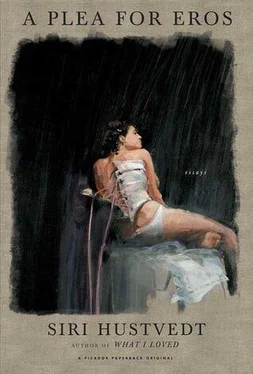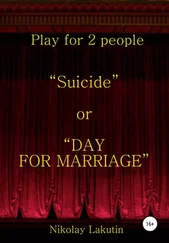But staring, even staring in this crude from, does not seem criminal to me. “Officer, he’s staring. Arrest him,” has a feeble ring to it. And I say this despite the fact that twice in my life I found myself the object of what would have to be described as aggressive staring. For several years, when I was in high school and then attending college in the same town, a young man I knew only slightly would appear out of nowhere and stare. He did not stare casually. He stared wholeheartedly and with such determination, he made me nervous and uncomfortable, as if he did it to satisfy some deep longing inside him. Without any warning, I would find him stationed outside the restaurant where I worked or outside the student union at my college, his eyes fixed on me. They were enormous pale eyes, ringed with black, that made him look as if he hadn’t slept in weeks. “I’ve been standing here since eight o’clock this morning,” he said to me once at three in the afternoon, “waiting for you.” One night after work he followed me through the streets. I panicked and began to run. He did not pursue me. The problem was that he acted in ways that struck me as unaccountable. He would make abrupt changes in his appearance — suddenly shaving his head, for example. He walked all the way to my parents’ house to deliver a gift, badly packed in a cardboard box. Filled with dread, I opened the box, only to find an ugly but innocent green vase. Not long before I received the vase, this young man’s twin brother had killed himself in a cafe in a nearby town. He had gone there for breakfast and then, after finishing his meal, took out a gun and blew his brains out. I am sure I associated the actions of the twin with the one who survived, am sure that the staring frightened me because I imagined potential violence lurking behind those eyes. The looks he gave me were beyond anything I had ever encountered, but I also honestly believe he meant me no harm. Perhaps in his own way he was in love. I don’t know. But the crux of the story is that I think I brought it on myself without meaning to. Once, when I was in high school, I hugged him.
I worked at a place called the Youth Emergency Service, and the staring boy used to hang out there. I don’t know where he lived or how he managed. He didn’t go to school. He was sad that day, as he probably was most days, and we talked. I have no recollection of that conversation, but I know that in a fit of compassion I hugged him. I am convinced that the whole staring problem hinged on this hug, and to this day when I think of it I am mortified. Acts cannot be retrieved and, sometimes, they last. This is not a simple story. I often wonder if any story is, if you really look at it, but I carry his face around with me and when I think of him and the former me I feel sorry for both of us.
The other staring man was a student of mine at Queens College. I taught freshman English there and an introductory literature class. My teaching was passionate, occasionally histrionic, but I was a young woman on a mission to educate, and sometimes I did. This student was clearly intelligent, although he had profound and jarring diction problems. His papers were written in a gnarled, convoluted style that was meant to be elevated but was often merely wrong. Eventually, I came to recognize that there were signs of schizophrenia in the writing, but that wasn’t until later. I had private sessions with all my students. These meetings were required, and when I met with him, I urged simplicity and hiding his thesaurus forever. The trouble began when he was no longer my student. He would barge into my office unannounced and throw unwanted gifts onto my desk — records, perfume, magazines. He, too, had a penchant for inexplicable transformations, for flannel shirts one day and silky feminine tops the next. On a balmy afternoon in late April, he visited me wearing a fur coat. Another time, I looked up to find him standing in my little graduate-assistant cubicle, his fingers busily unbuttoning his shirt. This story rings with comedy now, but I was aghast. In my best schoolteacher voice, I shouted, “Stop!” He looked terribly hurt and began stamping his foot like a three-year-old, whining my first name, as though he couldn’t believe I had thwarted him. After that, he would park himself outside the classroom where I taught and stare at me. If I looked a little to the right, I would see him in my peripheral vision. The staring unnerved me, and after several days of it, I was scared. When I crossed the campus, he would follow me — an omnipresent ghost I couldn’t shake. Talking to him did no good. Yelling at him did no good. I went to the college police. They were indifferent to my alarm. No, more than that, they were contemptuous. I had no recourse. In time, the student gave up, and my ghost disappeared, never to bother me again. The question is, What does this story exemplify? Would it be called “sexual harassment” now, because of the shirt episode? Was it stalking? What he actually did to me was innocuous. The fear came from the fact that what he did was unpredictable. He did not play by the rules, and once those rules had been broken, I imagined that anything was possible.
Neither of these staring experiences was erotic for me, but they may have been for the two young men who did the staring. Who I was for either of them remains a mystery to me, a blank filled with my own dread. They have lasted inside me as human signs of the mysteries of passion, of emotional disturbance and tumult, and despite the unpleasantness they caused me, I am not without compassion for both of them. I have stared myself. Looking hard is the first sign of eros, and once, when I was fourteen, I found myself staring very hard at a house. I had fallen in love with a boy who was fifteen. He cared nothing for me and was involved with a girl who had what I didn’t have: breasts. She fascinated me almost as much as he did, because, after all, she was his beloved, and I studied her carefully for clues to her success. One Saturday in the fall, I walked to his house, stood outside on the sidewalk, and stared at it for a long time. I’m not sure why I did this. Perhaps I hoped he would walk out the door, or maybe I thought I might gain the courage to ring the bell. I remember that the house looked deserted. Probably no one was home. It was a corner house on a beautiful street in Northfield, lined with elms. The elms are all dead now, but I remember the street with trees. That house, which once was his house, is still suffused with the memory of my terrible ache for him, a longing I found almost unbearable and which was never requited. Years later, when I was grown (much taller than he ever grew) and I saw him in a local bar, he remembered my “crush” and said he regretted not acting on it. As silly as it sounds, this confession of his gave me real satisfaction, but the fact is he didn’t want the fourteen-year-old I had been but the twenty-two-year-old I had become — another person altogether.
Ogling should be legal. Looking is part of love, but what you see when you look is anybody’s guess. Why that skinny ninth-grade boy with glasses sent me into paroxysms of longing I couldn’t tell you, but he did. Feelings are crude. The ache of love feels remarkably like the ache of grief or guilt. Emotional pain isn’t distinguishable by feeling, only by language. We give a name to the misery, not because we recognize the feeling but because we know its context. Sometimes we feel bad and don’t know why or don’t remember why. Mercifully, love is sometimes equal and two people, undisturbed by the wrong underwear or the wrong nose, find each other inside this mystery of attraction and are happy. But why?
Contentment in love usually goes unquestioned. Still, I don’t think enduring love is rational any more than momentary flings. I have been married to the same man for fifteen years, and I can’t explain why he still attracts me as an erotic object. He does, but why? Shouldn’t it all be worn out by now? It is no! because we are so close or know each other so well. That solidifies our friendship, not our attraction. The attraction remains because there’s something about him that I can’t reach, something strange and estranging. I like seeing him from a distance. I know that. I like to see him in a room full of people when he looks like a stranger, and then to remember that I do know him and that 1 will be going home with him. But why he sometimes strikes me as a magical being, a person unlike others, I can’t tell you. He has many good features, but so do other men who leave me cold as a stone. Have I given him this quality because it is efficient for me, or is it actually in him, sonic piece of him that I will never conquer and never know? It must be both. It must be between us — an enchanted space that is wholly unreasonable and, at least in part, imaginary. There is still a fence for me to cross and, on the other side of it, a secret.
Читать дальше












